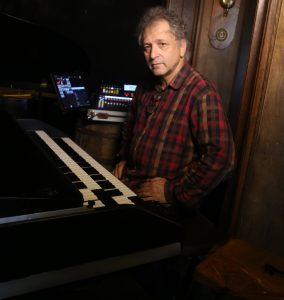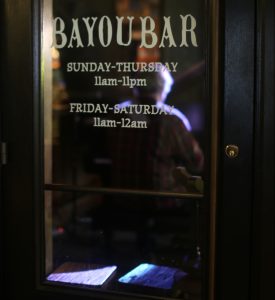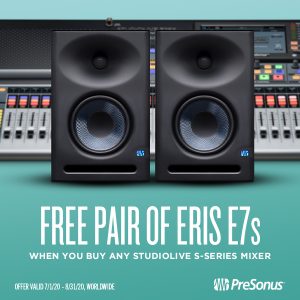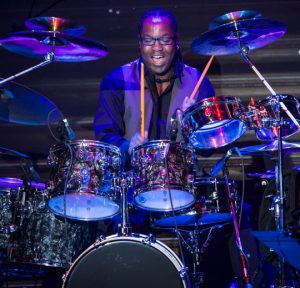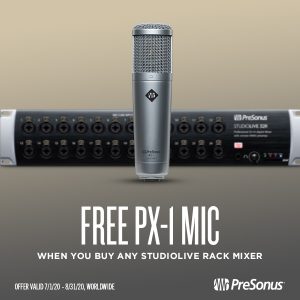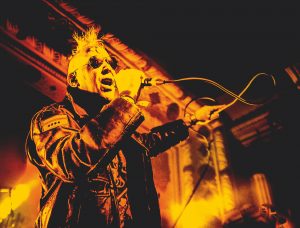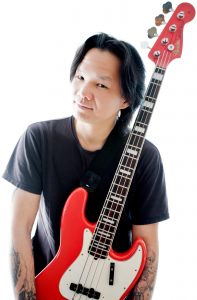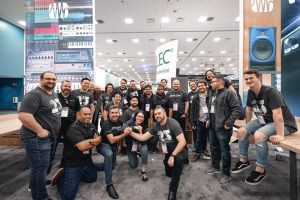Tag Archives: Musician
KRIS XEN: Modern Fusionist with PreSonus Studio One
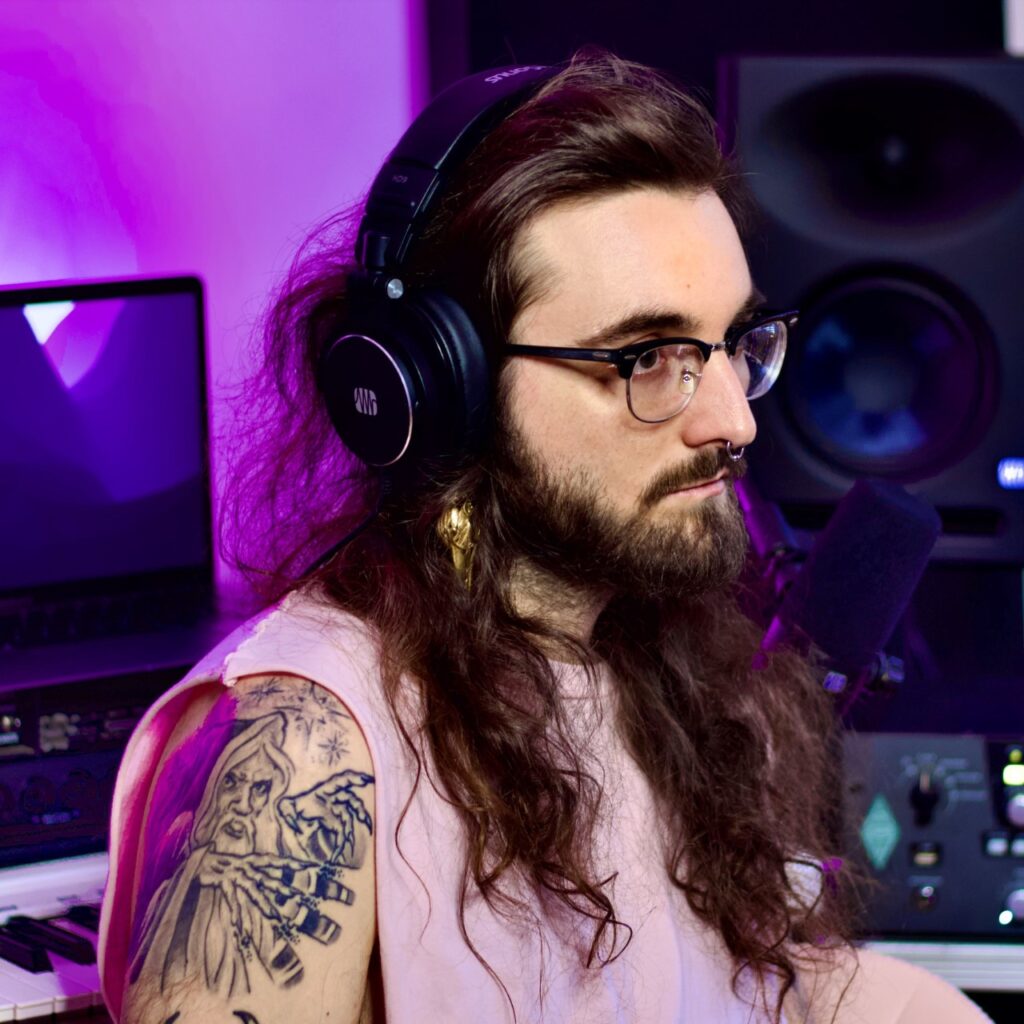
Kris Xenopoulos, AKA “KRIS XEN” is a South African guitar player, musician and producer.
Most well-known for his work with South African death metal outfit, Vulvodynia and the meme-tastic comedy metal band xavlegbmaofffassssitimiwoamndutroabcwapwaeiippohfffx, KRIS XEN does not only have heavy riffs on his mind, but also manages to blend multiple genres into a seamlessly flowing track.
He’s also explored instrumental, guitar-driven music with his prog band Technopath… and now Kris is now branching out as a solo artist.
“I’ve been using PreSonus gear since I was 16 years old, I couldn’t be happier to be working with a brand that’s been such a big part of my life over the years.”
—KRIS XEN (2022)
KRIS XEN takes you on a musical journey that could only be described as modern fusion.
Born in Johannesburg, South Africa, and raised in Durban, he starting off as a drummer at the age of 11 and became addicted to guitars as a young teenager. He started his first bands at the age of 13 and eventually became a member of one of the most famous death metal outfits in South Africa; Vulvodynia. He is constantly evolving as a guitarist, producer and musician, and developed a great love for expanding his musical knowledge and touring.
During the pandemic Kris focused hard on writing, recording guitar and producing Vulvodynia’s most recent offering Praenuntius Infiniti from his home studio. The album was mixed and mastered by Christian Donaldson.

He has played in Ron Bumblefoot Thal’s (ex-Guns N Roses, Sons Of Apollo) band, done multiple headlining tours in Europe with Vulvodynia and Xavleg, and has headlined tours in the States, Australia, and Africa with Vulvodynia.
In Technopath, Kris has worked with some legendary musicians such as Brian Beller (Bass for The Aristocrats, Steve Vai, Joe Satriani), Mattias IA Eklundh (Freak Kitchen) and Nick Johnston.
Kris has also been featured in Guitar World Magazine and was the cover page for “New Voices In Guitar,” outlining “10 fresh guitarists to keep an ear out for in the coming year” for 2020.
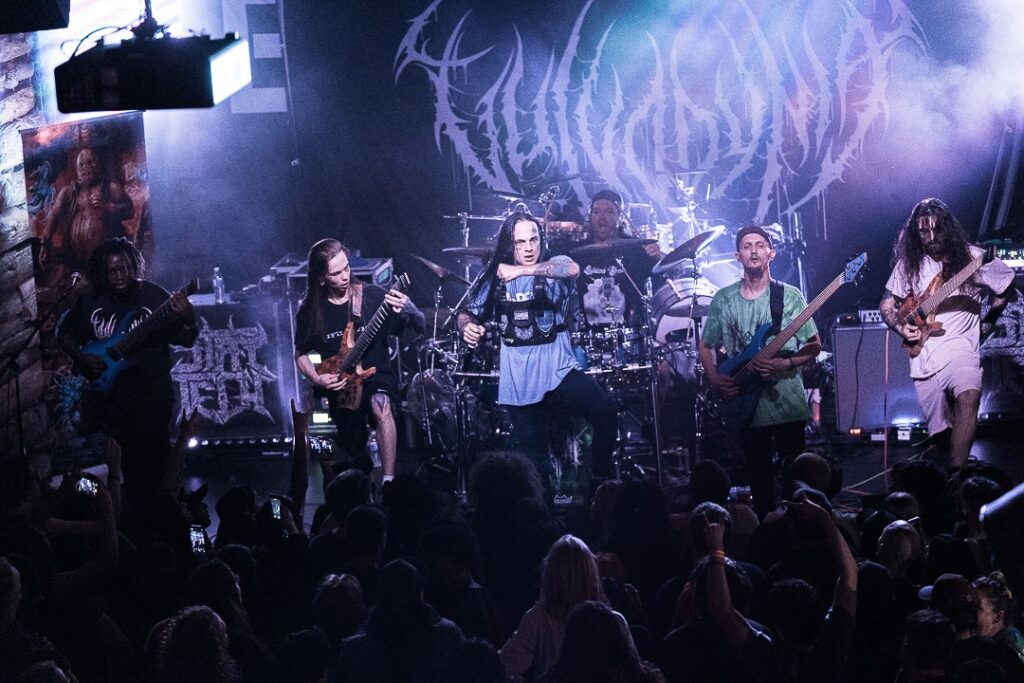
Kris has just released a signature guitar with Ormsby Guitars, available worldwide and is presently on tour throughout the United States with Vulvodynia.
Follow KRIS XEN on Instagram for tour information and musical updates!

Join PreSonus Sphere today to check out KRIS XEN’s exclusive Presets and more by other PreSonus artists!
Only $14.95 per month for Studio One Professional, Notion, and so much more.
David Torkanowsky: Livestreaming in the Big Easy with StudioLive 32SC
[For those of you who don’t know already about the talented New Orleans based jazz pianist David Torkanowsky, you are about to. Lucky for us, New Orleans is just an hour drive to the Southeast of Baton Rouge (where PreSonus is based out of).
We’re honored to have our relationship with David: not only is he a true master improvising musician from the city where Jazz was born, he is also in tune with the latest 21st century audio technology that helps artists actualize and share their sound to audiences world-wide.
Without any further ado, we’ll let him take it from here…]
I’m David Torkanowsky and I’ve been lucky to have grown up in New Orleans under the tutelage of Ellis Marsalis, Danny Barker, James Black, Al Hirt and other Smithsonian-level greats… too many to mention.
I’ve also toured and recorded with artists as different as Al Hirt and Al Jarreau, Boney James, and Joe Henderson. I’ve been M.D. for the great vocalist Dianne Reeves.
The touring and performance economic model for all musicians, regardless of genre, has been decimated by the COVID-19 pandemic.
Many artists, myself included, have navigated a sudden and steep learning curve regarding our social media presence. New Orleans has always tended toward the organic and away from the technical aspects of playing music, which I love… but that paradigm has proven to be a headwind as we move toward our new reality.
Online work has moved from being one of the revenue channels in our business model to the only viable channel.
Posted by PreSonus Audio Electronics on Thursday, May 28, 2020
So, I’ve been producing, directing and playing in livestreams from The Bayou Bar at The Pontchartrain Hotel in New Orleans for the past month, with artists such as: Ivan Neville, Nigel Hall, The Tin Men, Zachary Richard, Meschiya Lake, Sasha Masakowski, Jason Marsalis, Herlin Riley, Davell Crawford, and jazz great Cyrille Aimée.
Many cats are teaching online, and many more are performing live. These live performances have completely replaced the in-person delivery of our art. Although, in many respects, it will never duplicate the transformative experience of being in the same space. The only way we can minimize this disparity is by presenting this content in the best possible way. Primarily, it has to sound good! Most of the streams that I’ve seen, some with world-class artists, don’t really touch me because they sound less than average. A solo acoustic instrument can sound just okay through an iPhone mic, but it’s never truly impactful. Add any other instruments, and you can just forget about it.
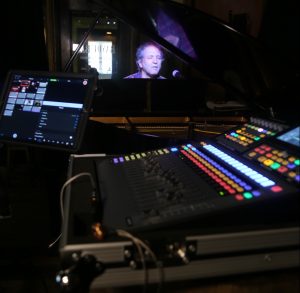 That’s why the PreSonus partnership has been such an asset.
That’s why the PreSonus partnership has been such an asset.
I’ve gotten a massive amount of feedback (the good kind!) from the listening public about how amazing these artists are sounding on these social media live broadcasts, and there’s one reason:
The PreSonus StudioLive 32SC. Their newest Series III S line of consoles are exactly what the doctor ordered to mix streamed performances. I’m using the 32SC, the powerful and compact member of the Series III family. The Fat Channel technology makes tweaking the impact of a particular instrument intuitive and fast. The EQ, Compression and digital FX are all super usable. It’s a game-changer. It’s one serious piece of gear!
Contact David for professional inquiries: torkanowsky@me.com
[Incidentally, from now until Aug 31, 2020, anybody who buys a qualifying StudioLive Mixer will get a pair of Eris E7 monitors for free!]
Jakubu Griffin: using the StudioLive 24R as a USB Audio Interface
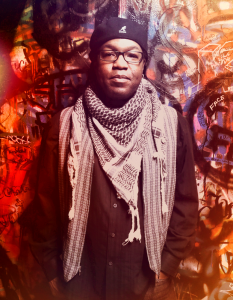 [Jakubu Griffin is truly one of Las Vegas and NYC’s most versatile drummers. Son of trombonist Dick Griffin (who played with the legendary Rahsaan Roland Kirk), he has been surrounded by music from an early age. Growing up with many musical instruments and influences around him, he was always drawn to percussion and can remember playing the drums as early as age 3 or 4. He started studying classical piano at age 5, and later added the trumpet.
[Jakubu Griffin is truly one of Las Vegas and NYC’s most versatile drummers. Son of trombonist Dick Griffin (who played with the legendary Rahsaan Roland Kirk), he has been surrounded by music from an early age. Growing up with many musical instruments and influences around him, he was always drawn to percussion and can remember playing the drums as early as age 3 or 4. He started studying classical piano at age 5, and later added the trumpet.
Jakubu has performed and led groups all over the world. While living in Las Vegas in the early 2000s, He was featured in David Cassidy and Sheena Easton’s “At The Copa” at the Rio Resort. After that, he was musical contractor and drummer on a show featuring Chaka Khan, Peabo Bryson, and Melissa Manchester called Signed, Sealed, Delivered: a Celebration of Stevie Wonder’s Music at the Venetian Resort.
Griffin has also been a musical director for Kings Productions, as well as Norwegian and Premier cruise lines. Back in the NYC area where he grew up, he has performed and recorded with award winning jazz trumpeter Dave Douglas, Ryko/Warner recording artist Matt White, and Broadway stars Tracie Thoms (Rent, Case) and Shoshana Bean (Wicked). Jakubu is currently playing with the legendary Las Vegas singer Clint Holmes. He was also the house drummer for Cirque Du Soleil’s production of Zarkana which premiered at NYC’s world famous Radio City Music Hall in June of 2011, moving on to Madrid, as well as having a historic run at the Kremlin Theater in Moscow in 2012. Jakubu’s powerful, yet very musical drumming reputation has been highly appreciated by many musicians and music lovers both here and abroad.
When not on the road, he’s kept busy at home recording and teaching. But, with the recent stay-at-home measures implemented due to COVID-19, working in his own studio has become his primary focus.
Jakubu has graciously given us a virtual “walk-through” of his home studio environment, where the StudioLive 24R is the centerpiece and his dedicated audio interface to his DAW of choice, Studio One. Let’s check out his setup and how he’s been using our products in action at home.]
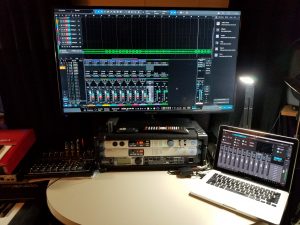 Jakubu: My first audio interface was the PreSonus Studio 192 along with the DigiMax DP88. As a drummer, I need to have at least 8 channels dedicated to drums in my space at all times for my own use. With the Studio 192 and DP88 giving me 16 total channels and great preamps, I was able to stack them in a rack and run my 8 drum channels into the DP88 using the Studio 192 rear channels for my keyboards, bass, extra drum channels etc. and even leaving the 2 front channels open for a vocalist or instrument to plug right in. As my studio evolved, I graduated to the StudioLive 24R rack mixer, as well as the NSB 8.8 AVB Networked Stage Box to expand channel inputs in my other rooms.
Jakubu: My first audio interface was the PreSonus Studio 192 along with the DigiMax DP88. As a drummer, I need to have at least 8 channels dedicated to drums in my space at all times for my own use. With the Studio 192 and DP88 giving me 16 total channels and great preamps, I was able to stack them in a rack and run my 8 drum channels into the DP88 using the Studio 192 rear channels for my keyboards, bass, extra drum channels etc. and even leaving the 2 front channels open for a vocalist or instrument to plug right in. As my studio evolved, I graduated to the StudioLive 24R rack mixer, as well as the NSB 8.8 AVB Networked Stage Box to expand channel inputs in my other rooms. 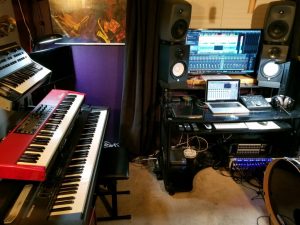 Since I don’t have the space for a console mixer on my workstation, the StudioLive 24R is the perfect solution for me with UC Control as my console. I use the HP60 for 6 stereo headphone mixes. With a router plus the network control via Wi-Fi of the StudioLive 24R, my clients have the option of using the QMix-UC app to control their own headphone mixes. The PreSonus Monitor Station allows me flexibility to switch between my different sets of of studio monitors and speakers, and also gives me 4 more headphone outputs if needed. I’ve used other DAWs, but I’m completely sold on Studio One Professional because it’s just more user/musician friendly. I understood more about using Studio One in 24 hours than I’ve learned on other DAWs after countless months of usage. I’m a musician first, not an engineer.
Since I don’t have the space for a console mixer on my workstation, the StudioLive 24R is the perfect solution for me with UC Control as my console. I use the HP60 for 6 stereo headphone mixes. With a router plus the network control via Wi-Fi of the StudioLive 24R, my clients have the option of using the QMix-UC app to control their own headphone mixes. The PreSonus Monitor Station allows me flexibility to switch between my different sets of of studio monitors and speakers, and also gives me 4 more headphone outputs if needed. I’ve used other DAWs, but I’m completely sold on Studio One Professional because it’s just more user/musician friendly. I understood more about using Studio One in 24 hours than I’ve learned on other DAWs after countless months of usage. I’m a musician first, not an engineer.
Jakubudrum Studios is my home as well as my recording space. I have three isolated rooms on one floor. I have eight CCTV cameras installed, and video monitors in every room for visual communication. My main “studio” room is my acoustically-treated drum and keyboard room, as well as my control booth. 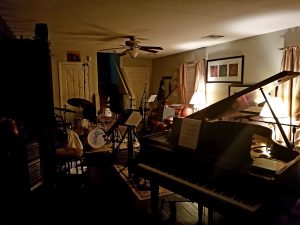 My living room is my large room and features my Baldwin L grand piano. My smaller acoustically-treated room is great for acoustic bass as well as other instruments, and it also serves as a vocal booth and isolated amp miking room. I’ve done several live recording sessions in the studio with different configurations ranging from solo piano to live strings… and various band sizes, genres, horn combinations, etc. I do a lot of drum and percussion tracking for projects myself, but I’ve also engineered tons of keyboard track layering sessions, instrument tracking sessions, vocal tracking, and my space is perfect for tracking bass and drums together. I record voice-overs as well, and I’m currently producing an audiobook session.
My living room is my large room and features my Baldwin L grand piano. My smaller acoustically-treated room is great for acoustic bass as well as other instruments, and it also serves as a vocal booth and isolated amp miking room. I’ve done several live recording sessions in the studio with different configurations ranging from solo piano to live strings… and various band sizes, genres, horn combinations, etc. I do a lot of drum and percussion tracking for projects myself, but I’ve also engineered tons of keyboard track layering sessions, instrument tracking sessions, vocal tracking, and my space is perfect for tracking bass and drums together. I record voice-overs as well, and I’m currently producing an audiobook session.
Now that I have the StudioLive 24R, I have the luxury of using 14 dedicated drum channels just for myself. I usually use two different sets of overhead mics simultaneously, another stereo room mic, and a subkick along with my normal kick, snare, hi hat, and tom mic combinations. 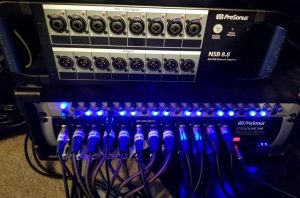
I also use seven channels for my keyboards, and a channel for my bass amp to run direct with a pre amp. I use the NSB 8.8 Stage Box in the other rooms to mic the piano, horns, strings, vocals, etc. I use the 12 outputs from the 24R mixer to sum 2 outputs to each of the 6 stereo inputs of the HP60 headphone amp and made them stereo mixes from UC Control. Again, I have a router connected to the 24R mixer and a network setup so people have the option of using QMix-UC to control their own headphone mixes. I have two sets of studio monitors, but I also have small PA for the keyboards, rehearsals, gigs etc. The monitor station is actually one of my favorite pieces of PreSonus gear to be honest. I love the versatility I have with 2 sets of monitors, but I even use the PA as a 3rd reference sometimes. The Monitor Stations onboard talkback routed through the HP60 is perfect for my setup, plus I’m the type of guy that just needs a big volume knob in my life since I don’t have a console.
So, funny story: I actually learned about PreSonus through another drummer, Dre Boyd, who is also an Artist with them. We both met and quickly became good friends working for the Cirque Du Soleil company. I finally had the space and needed an interface to start getting into recording and he highly recommended the Studio 192 and DP88. I’m an impulse buyer, but he told me to wait so he could “hook me up” with his representative at PreSonus. Well I’m impatient and went ahead with the purchase of the interfaces anyway. I was ecstatic, but then a couple weeks later Dre let me know that the PreSonus Artist Relations Manager was none other than my college buddy, Perry Tee… so I should have waited!!! Not only do I love the products, PreSonus reconnected me with an old friend, who happens to be on guitar in this video below that we produced remotely with 4 other buddies using Studio One Professional:
I love the power and versatility that I have with the StudioLive 24R mixer, especially for low-end instruments. Now I have the ability to mic an acoustic bass and get a warm, powerful tone without any need for a DI or outboard preamp. Its considerably better for my drum miking as well. I get better headphone mixes, and I have plenty of room and power to hear my kick drum perfectly which can be a problem in regular interfaces without external pre amps. The ability to control mixes across Wi-Fi is a true bonus allowing my clients the flexibility to control their own mixes with QMix-UC. The HP60 is a great solution for my headphone needs with 6 channels, and stereo mixes plus the Monitor Station is one of my favorite additions to the studio, and has made my work flow much smoother and faster. The onboard talkback is perfect for my space. Studio One is absolutely the best DAW available, in my opinion. I know has everything I could possibly need for my studio. Everything in my setup works seamlessly. I couldn’t be more satisfied with the sounds, and results I get with my gear.
Every piece of gear is perfectly matched and catered to the needs of my workflow and studio ecosystem… thank you, PreSonus!
For professional inquiries, contact: jakubudrum@gmail.com
[Incidentally, from now until Aug 31, 2020, anybody who buys a qualifying StudioLive Rack Mixer will get a PX-1 microphone for free!]
Sascha Konietzko (KMFDM) Talks Studio One
Hello… this is Sascha Konietzko a.k.a Käpt’n K, a native of Germany, founder of KMFDM in 1984 (when I was living in Paris, France), a producer and remixer for the past 35+ years.
Besides KMFDM, I’ve done work to more or lesser degrees of involvement with a number of projects on the side: MDFMK, EXCESSIVE FORCE, KGC, SCHWEIN, PIG, and SKOLD, to name a few. As a remixer, I was fortunate enough to contribute to bands such as Metallica, Rob Zombie, Megadeth, The Young Gods, Front 242, Die Krupps and many more.
Under the moniker KMFDM, I have released 21 studio albums, as well as dozens of singles, EPs and live albums.
I’ve been using the PreSonus StudioLive 24.4.2 digital console mixer for live shows (monitor setup) for a number of years now, as well as Studio One Professional and the trusty ol’ Studio Channel. Studio One Professional has been used in my personal studio, mainly to record vocals.
So here’s the story: I’ve been using Pro Tools since 1991; previously I’ve worked with the earlier version of it, which was Sound Designer II. Over the years Pro Tools evolved into a platform with many great features, but also many (not to be underestimated) negative aspects—such as severe latency, under some circumstances.
When I discovered Studio One, which was actually highly recommended to me by KMFDM’s drummer Andy Selway, I found out that I could easily use the workflow I’ve come to develop over the years with the click of a button, PLUS… and this is the absolutely greatest feature of Studio One Professional in my mind: without any latency AT ALL. It allows me to interchange seamlessly between my recording and my mixing environments!
Seriously, it’s been a lifesaver after so many situations where a recording session just went downhill really quick due to latency issues in Pro Tools, with frustrated performers and a super-frustrated Yours Truly!
Website | Spotify | YouTube | Instagram | Facebook | Twitter
The Various Sound-Worlds Of Anna Clark
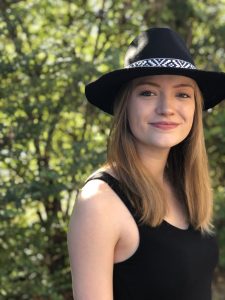 Nineteen year-old Anna Clark works as a Grammy-nominated vinyl mastering engineer at Welcome to 1979 Industries. Nine years ago, she founded 501(c)(3) organization Guitars 4 Gifts, which has given over 1,000 youths access to their first musical instrument.
Nineteen year-old Anna Clark works as a Grammy-nominated vinyl mastering engineer at Welcome to 1979 Industries. Nine years ago, she founded 501(c)(3) organization Guitars 4 Gifts, which has given over 1,000 youths access to their first musical instrument.
As a lifelong singer/songwriter/musician, Anna has performed live on Lightning 100 (Nashville’s premier independent radio station), she holds a Certificate in Music Business from the Berklee College of Music and is currently on track to graduate from Belmont University in 2022.
When not working on one of her passion projects, Anna loves to spend time with her dogs or attend concerts with her friends and family.
Let’s find out more about how she’s been navigating through and actualizing all of these different creative sonic environments!
What hardware and software tools help you with your audio work at home these days?
I currently use a StudioLive 16 mixer, a Central Station Plus, HP4 headphone amp, a pair of Sceptre S6 monitors, and Studio One DAW software.
Originally, a friend introduced me to your monitors and I basically fell in love with using them. Because I work in many different areas of audio engineering, I needed products that I could use for any area that I was working in, so that I wouldn’t have to have different setups.
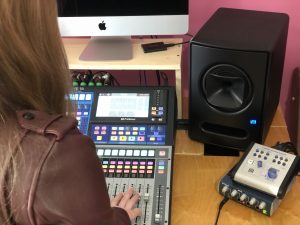 I use my StudioLive mixer pretty much every day. It is great because I save different scenes so that if I am recording a guitar/vocal demo, I have some EQ and compression settings saved, and I can bring them up super easily. I love that I can A/B EQ settings using the A/B button, and I also love the vintage EQ and tube compressor. I also have scenes saved for full band sessions, piano/vocal sessions, and more. The StudioLive mixer makes it super convenient for me to walk up and start working. I will also say that I carry it with me everywhere to run sound for live shows and recordings, and have even used it for a live broadcast of a show. It has never let me down and has always been very easy to set up! Because I am able to save settings from my recording sessions, it makes it even easier to set up for a live show.
I use my StudioLive mixer pretty much every day. It is great because I save different scenes so that if I am recording a guitar/vocal demo, I have some EQ and compression settings saved, and I can bring them up super easily. I love that I can A/B EQ settings using the A/B button, and I also love the vintage EQ and tube compressor. I also have scenes saved for full band sessions, piano/vocal sessions, and more. The StudioLive mixer makes it super convenient for me to walk up and start working. I will also say that I carry it with me everywhere to run sound for live shows and recordings, and have even used it for a live broadcast of a show. It has never let me down and has always been very easy to set up! Because I am able to save settings from my recording sessions, it makes it even easier to set up for a live show.
Basically, I have various synths, mics, instruments, etc. that I leave set up so that I can record an idea at any time and they go directly into the mixer. From there, I use the Central Station which outputs to my Sceptre monitors along with other monitors and a PreSonus HP4.
We’re curious about your work as a vinyl mastering engineer… can you tell us about that sound-world?
The first thing I do when I’m mastering a project for vinyl is look at all of the files and create a session for them. 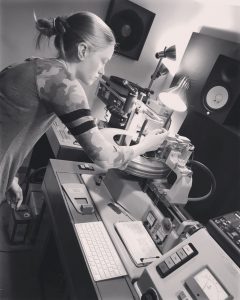 I then check the length of both of the sides. For each speed and size of disk, there are certain limits for how long the side can be. Next, I typically adjust the overall level of the project. Usually, the project is too loud, even if it hasn’t been mastered before. The louder the project is, the wider the grooves are. If the grooves are too wide and take up too much space, the project won’t be able to fit on the lacquer (the type of disk I cut on to make a vinyl master). I then mono the low end and use an EQ to filter out any frequencies that may give me problems. Sometimes if the vocal has too much sibilance it can cause issues, especially if there are also a lot of hi-hats/cymbals. I then run the project down to make sure it will fit and also to make sure there won’t be any trouble areas. If everything looks good, I’ll cut the project after that! Before I cut a lacquer, though, I have to use a microscope to look at a couple test cuts and make sure the stylus is working properly and that there is enough space in between the grooves.
I then check the length of both of the sides. For each speed and size of disk, there are certain limits for how long the side can be. Next, I typically adjust the overall level of the project. Usually, the project is too loud, even if it hasn’t been mastered before. The louder the project is, the wider the grooves are. If the grooves are too wide and take up too much space, the project won’t be able to fit on the lacquer (the type of disk I cut on to make a vinyl master). I then mono the low end and use an EQ to filter out any frequencies that may give me problems. Sometimes if the vocal has too much sibilance it can cause issues, especially if there are also a lot of hi-hats/cymbals. I then run the project down to make sure it will fit and also to make sure there won’t be any trouble areas. If everything looks good, I’ll cut the project after that! Before I cut a lacquer, though, I have to use a microscope to look at a couple test cuts and make sure the stylus is working properly and that there is enough space in between the grooves.
Moving back to your home studio working environment; tell us more about how you’ve been using Studio One and what led you to our DAW?
For producing, tracking, mixing, and mastering. I will also occasionally use it for live recordings with my StudioLive 16 mixer. It has been a very helpful tool!
One of the main factors that lead me to it was when I was producing, being able to bounce between ideas easily and combine ideas from different files. I tend to either work with an “engineer” mindset or a “creative” mindset. Because of how easy Studio One is to use, I am able to start tracking a song while I am writing it, and I am able to keep my “creative” mindset. It helped me when I would be writing and producing at the same time, because it allowed me to be able to keep my creative hat on while still being able to engineer a track.
What Studio One features have proven particularly useful and why?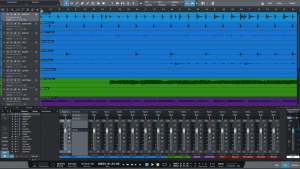
It is very quick and easy to use, which is helpful when recording live shows. It makes the show go a lot smoother when you’re not having to worry about having to spend a lot of time setting up a session, etc. I also love how well all of the PreSonus gear works together; it is extremely nice to have products that all communicate together so that I’m not wasting time trying to fix something. If I have an idea, I can walk right into my studio and know that I’ll be able to get everything down fast.
This was especially helpful when I was just getting started as an engineer, because everything was very straightforward when I was setting it up.
All of the PreSonus products work in many different settings. For example, I originally purchased my StudioLive board for live events, but I use it in a studio setting as well and love it there, too!
Finally, let’s talk about you as a creative musical artist!
My main influences for my own music are artists like Maggie Rogers, Florence and the Machine, and St. Vincent. I have a love for analog synths and was lucky enough to get my hands on a couple for this project. I used a Roland Juno 6 and a MOOG Sub Phatty for most of the songs, and then had a drummer/guitarist/bassist add parts to each of the songs as well. I love using basic tools like EQ and reverb to make new sounds that I haven’t heard before.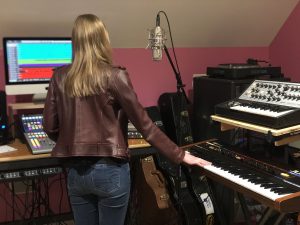 Typically, I will use the Pro EQ plugin that comes with Studio One to take out certain frequencies. The majority of EQ’ing I do is subtractive, because I like to make sure that every instrument has its own space in my songs. A lot of my time is spent experimenting with lots of different effects to try to get the sounds that I can hear in my head. I love the depth that an analog synth and live instruments can bring to a session, but I also love being able to edit a project easily. Even though I’ll record a lot of different instruments, I like to be able to edit each of the parts so that you can feel the song “build up” from each of the verses to the chorus. Studio One makes it really easy for me to audition different parts and figure out what I like. I am also known for creating a bunch of different versions of the same song, and Studio One is able to make my workflow seamlessly. I use the Scratchpad function because I typically write a song while I am also recording it, so I am able to try out different ideas without having to commit. That is one of the things that Studio One does best, is it works for Engineers, but also Songwriters, Artists and Producers of creative content these days online.
Typically, I will use the Pro EQ plugin that comes with Studio One to take out certain frequencies. The majority of EQ’ing I do is subtractive, because I like to make sure that every instrument has its own space in my songs. A lot of my time is spent experimenting with lots of different effects to try to get the sounds that I can hear in my head. I love the depth that an analog synth and live instruments can bring to a session, but I also love being able to edit a project easily. Even though I’ll record a lot of different instruments, I like to be able to edit each of the parts so that you can feel the song “build up” from each of the verses to the chorus. Studio One makes it really easy for me to audition different parts and figure out what I like. I am also known for creating a bunch of different versions of the same song, and Studio One is able to make my workflow seamlessly. I use the Scratchpad function because I typically write a song while I am also recording it, so I am able to try out different ideas without having to commit. That is one of the things that Studio One does best, is it works for Engineers, but also Songwriters, Artists and Producers of creative content these days online.
I feel very lucky that I found your products because it has really helped me grow my studio and career. Thank you, PreSonus!
Website | Instagram | Facebook
PreSonus Fam Friday with Perry Tee!
Our Artist & Influencer Relations Manager, Perry Tee (and all around coolest guy in the world) is up for PreSonus Fam Friday!
How long have you worked for PreSonus?
I joined the company in 2012.
What’s your favorite thing about your job? Why did you choose to work here?
Being able to develop meaningful relationships with influential and creatively successful people to showcase real-world use cases of our product line in action; ultimately bringing humans together from different backgrounds in life who share a common love of expressing themselves through sound and vision.
So I moved out to Louisiana from California to get away for a bit; a sabbatical from the L.A. hustle, if you will. Being the birthplace of Jazz, New Orleans to this day still has a vibrant live music scene compared to other cities and I had enough $$$ saved up to live for at least 6 months. So I went from one L.A. to another LA.
For those who aren’t aware, PreSonus is based an hour northwest of New Orleans and they were hiring so I applied, got hired and ended up moving to Baton Rouge. Even though I no longer live in Louisiana, I’m still very lucky to be working daily with such amazing talented people. No other company is quite like us in terms of camaraderie and dedication to making things happen, world-wide.
What instruments do you play?
Keyboard, guitar, drums, trumpet, sax and flute. Studio One is the DAW environment is where I record and produce tangible recorded audio assets for others to use. But playing *live* with other musicians has always been my greatest strength and main love, in terms of collaborative creative events.
Of all of them, what’s your favorite?
They’re all enjoyable to play and sonically express my emotions with. It just depends on the musical framework I’m in at the moment. But it’s got to be executed live or not at all for me. And unintended human mistakes are typically the moments that makes music most interesting to me.
What is it that you love about “live” performance?
It’s fun, brings people together and a very instantaneous source of joy. When everyone is in sync with each other, it’s magical. I believe it showcases positivity in humanity.
Who has influenced your own playing or approach?
Everyone I’ve played music with onstage or worked alongside in recording studio sessions.
Everyone has a side gig, what’s yours? OR when you’re not at PreSonus, what are you up to?
Recording instrumental tracks for singers, producers and working on sound design. Teaching applied music theory, ear training plus improvisation to students young and old. Diving deeper into modular synthesis. Updating my coding skills. But most of all, being the best Dad possible.
Choose a movie title for the story of your life.
“Interstellar”. I constantly travel between different ‘worlds’ and can access experiences from all points in the timeline of my life’s stored memory banks to find viable solutions and resolving issues effectively. Never journeyed through a wormhole, though.
What’s your go-to Karaoke song?
“Regulate Ft. Nate Dogg” by Warren G.
Got any tips for working with Studio One?
Yes! Check out my Studio One “1-Minute Tip” videos:
Tell us about a successful event you worked with PreSonus products. InfoComm, NAMM, or an Install somewhere.
Every January, we congregate for a week in Anaheim to demo our Products and field questions like a tightly-knit family at The NAMM Show. Stop by and visit us at Booth #18801 in the North Building.
What are you currently working on at PreSonus? What’s next for you?
Finding more relevant product/use case resonant relationships for the company. We’re really interested in content creators and livestreamers with strong online audience engagement in addition to Artists, Producers, FOH Engineers, Studio Mix Engineers, and Mastering Engineers. Continuing to develop my Studio One chops as there’s always new improvements to our DAW happening regularly from user base input. Helping to make our products better every day for you all to enjoy and benefit from.
What’s the strangest talent you have?
I used to be able to perform the Doctor Who theme (lead synth melody line) using a cello bow on the edge of a standard hand saw; all while having gulped an entire packet of grape-flavored Pop Rocks and not letting the chaos inside my mouth affect my musical performance. That talent came to an end when all the bow hair frayed out… GAME OVER.
Anything else you want to share?
“No amount of money ever bought a second of time” (Howard Stark, The Avengers Endgame) really resonates the older I get and I hope that others will take that quote to heart too, as we make decisions that will inevitably shape the reality of what future generations will inherit from us.
Basically, choose wisely what you do with every moment of your lifetime and don’t take anything for granted!
Connect with PERRY TEE
